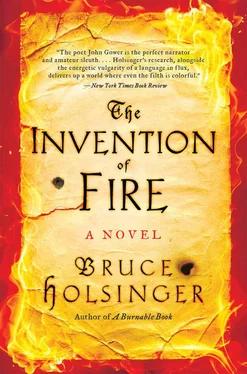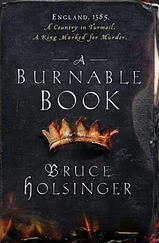Bruce Holsinger - The Invention of Fire
Здесь есть возможность читать онлайн «Bruce Holsinger - The Invention of Fire» — ознакомительный отрывок электронной книги совершенно бесплатно, а после прочтения отрывка купить полную версию. В некоторых случаях можно слушать аудио, скачать через торрент в формате fb2 и присутствует краткое содержание. Год выпуска: 2015, Издательство: HarperCollins, Жанр: Исторический детектив, на английском языке. Описание произведения, (предисловие) а так же отзывы посетителей доступны на портале библиотеки ЛибКат.
- Название:The Invention of Fire
- Автор:
- Издательство:HarperCollins
- Жанр:
- Год:2015
- ISBN:нет данных
- Рейтинг книги:3 / 5. Голосов: 1
-
Избранное:Добавить в избранное
- Отзывы:
-
Ваша оценка:
- 60
- 1
- 2
- 3
- 4
- 5
The Invention of Fire: краткое содержание, описание и аннотация
Предлагаем к чтению аннотацию, описание, краткое содержание или предисловие (зависит от того, что написал сам автор книги «The Invention of Fire»). Если вы не нашли необходимую информацию о книге — напишите в комментариях, мы постараемся отыскать её.
The Invention of Fire — читать онлайн ознакомительный отрывок
Ниже представлен текст книги, разбитый по страницам. Система сохранения места последней прочитанной страницы, позволяет с удобством читать онлайн бесплатно книгу «The Invention of Fire», без необходимости каждый раз заново искать на чём Вы остановились. Поставьте закладку, и сможете в любой момент перейти на страницу, на которой закончили чтение.
Интервал:
Закладка:
“Guns.”
“Cannon?” said Rune, leaning in.
I shook my head. “Something smaller, as the corpses were largely intact, drilled through with small shot. Nothing much larger than a child’s thumb ball.” My fingers brushed my thumb, recalling the heft of that first iron ball removed from one of the bodies, its killing weight.
The earl looked to the side. “Quite interesting.”
I waited, then said, “It is that, my lord.”
He glanced up at Rune, uneasily this time, then back at me. “Let me repeat my first question, Gower. What do you want?”
Once again I felt taken aback by the chancellor’s abrupt and peremptory tone, as if I were being impertinent with the questions I asked him, my presence a nuisance. “An answer, your lordship.”
“To what question?”
“Where did the killer or killers of these men procure these guns?”
“Explain yourself.”
“The city maintains no such handgonnes, as they are known. Nor are they in the possession of the church, and a hunter would hardly choose such instruments of war to bring down a hart. The only store of light artillery anywhere in or around London-if indeed a store exists at all-must lie within the Tower.”
Rune stepped out from behind me. I snapped my mouth shut and looked up at his protective sneer. “What are you implying, Gower? That the lord chancellor of England ordered the execution of sixteen unnamed men and had them thrown down a London privy?”
I showed him my palms, lowered my chin. “Nothing of the sort.” I looked back at the earl. “Forgive me if I sound accusatory, my lord.”
De la Pole waved a hand.
“I am merely suggesting that the weapons that took these men’s lives must have originated from within the royal army. As for who wielded them, and why-those are separate questions, and I am at a loss even to speculate at this point. But the guns strike me as a singular piece of evidence. I should be surprised if they don’t lead us to the source of this horrific violence.”
“Westminster does not investigate common killings,” said Rune. “That is the work of sheriffs, justices, and constables, not chancellors and kings.”
“They are hardly common killings, my lord,” I said, keeping my eyes on the earl. “Over a dozen men, shot through with iron, left to rot beneath-”
“Rot. Now there’s an apt word, eh, Rune?” The chancellor looked at his secretary. “Rotting bodies, rotting rights, rotting laws. ”
“How have I earned your disfavor, my lord?” I said. “Given all that happened in May of last year, your words to me then . . .” I let my voice trail off, asking for a small favor, and a sharper recollection from the earl.
The moment lengthened until finally the chancellor sighed, drummed his fingers on his desk. His jaw shook slightly. “What you’ve described, these deaths. A horror, and I will lend you what limited assistance I am able. Yet my authority diminishes by the day. You must be aware of the situation with that young fiend the Duke of Gloucester and the earls. FitzAlan, Beauchamp, even Mowbray is in on this plot. They will rise up to oppose me in the coming Parliament, I’ll be bound, and against Oxford as well.”
“Though deservedly so, in his case,” Rune muttered.
The chancellor laughed gruffly at this dismissal of Robert de Vere, the king’s sweet-faced favorite, soon to be created duke if the rumors were true: a title properly reserved for those of royal blood, yet given to this braggart with little thought, and littler wisdom. A further sign of the young king’s disregard for tradition and propriety in his royal appointments.
“Is it really all as dire as you suggest, my lord?” I said.
The earl tightened his mouth against the tremors. “Imagine yourself standing in the middle of a field, Gower. A field that has been the ground beneath your feet your whole life. You’ve tilled it, sown it, harrowed it, harvested it, repeated the cycle dozens, perhaps hundreds of times in your memory. You know every inch of the place. You’ve dug every furrow, hefted every stone, broken every clod.”
His gaze moved to the stone behind me. “Suddenly, without warning, the ground begins to shift. You stumble on unfamiliar rocks, tangle yourself in weeds you thought you had torn out from the root long ago. The soil stirs in places, little patches at first but growing, widening, joining together, and soon the entire field is churning at your feet, surging to your ankles. Then, as you watch, parts of the field begin to fall away. Square feet, square yards, misshapen patches of ground the size of rooms, swallowed by the unforgiving earth. Beneath it all is darkness, a great void, and all that prevents you from pitching into it yourself is the final patch of ground beneath your feet.”
He sat silently for a time, statued in his narrow chair. “And now you are powerless to do anything but stand there,” he said, “waiting for that last bit of earth to dissolve, and you with it.”
The chancellor’s bleak vision of his deteriorating position left me rattled. I could scarcely believe it had come to this. For time out of mind Michael de la Pole had been a figure of staunch constancy in the realm, as solid as an oak or the stone cross on Cornhill.
“You are the king’s conscience, my lord,” I said. “If conscience is defeated, what shall become of the realm?”
He narrowed his aged eyes, all withered shapes and angles. “Conscience, that hidden little worm, mining our souls. King Richard, I am afraid, has lost his worm.”
A harsh laugh escaped Rune’s throat. I looked up at him as he covered it with a shallow cough. “You’ll want an avenue to the Tower, then,” Rune said to me.
At last. “Though a twisted alley will be sufficient, my lord, so long as it leads me there by and by.”
“There is little enough to lose,” said the earl, gesturing for Rune to take a seat next to me. “Edmund, what do you say to our dark friend’s entreaty?”
Rune settled himself on the corner of my bench, elbows on his knees, his fingers steepled as he talked through the delicacies of the Tower and its administration. “The place is a labyrinth of competing interests. Lieutenants, captains, treasurers, stewards of the wardrobe, the king’s mint, the armorers and their craft, the chief officers of the guard. Even the masons have their own little principality down there. Many pies, many fingers and arses to lick.”
“I know what you must be thinking, Gower,” said the earl before I could reply. “Shouldn’t the king’s own chancellor have free rein on Tower Hill?”
“The castle and its appurtenances should be adjuncts of your office, my lord,” I said. “As close as your own arm.”
“A severed arm, perhaps, and not my own,” he mused. “Often it feels as if the Tower is as distant from Westminster as Jerusalem itself, or the seat of the Great Khan.”
“There are many good men down there, your lordship,” Rune allowed. “Men with larger interests than their own.” He turned to me with a smirk. “Though not, perhaps, in the armory.”
“Who runs it these days?” I asked. The king’s armory, though of central importance to the military machinery of the crown, had rarely provoked my interest, and I had no hold on anyone in the king’s wardrobe, under whose jurisdiction the armory fell.
Rune’s grey eyes flicked briefly toward the earl. “William Snell. Armorer to the king.”
I had encountered the name, though never met the man. “What can you tell me about him?”
“Little enough,” the chancellor said slowly, bringing his hands together on his desk. “He is a quite remarkable person, our Snell. An exceptional man, of greatest importance to His Highness. King Richard appointed him at the request of his uncle some years ago, before all the factions started tearing at one another’s throats.”
Читать дальшеИнтервал:
Закладка:
Похожие книги на «The Invention of Fire»
Представляем Вашему вниманию похожие книги на «The Invention of Fire» списком для выбора. Мы отобрали схожую по названию и смыслу литературу в надежде предоставить читателям больше вариантов отыскать новые, интересные, ещё непрочитанные произведения.
Обсуждение, отзывы о книге «The Invention of Fire» и просто собственные мнения читателей. Оставьте ваши комментарии, напишите, что Вы думаете о произведении, его смысле или главных героях. Укажите что конкретно понравилось, а что нет, и почему Вы так считаете.












